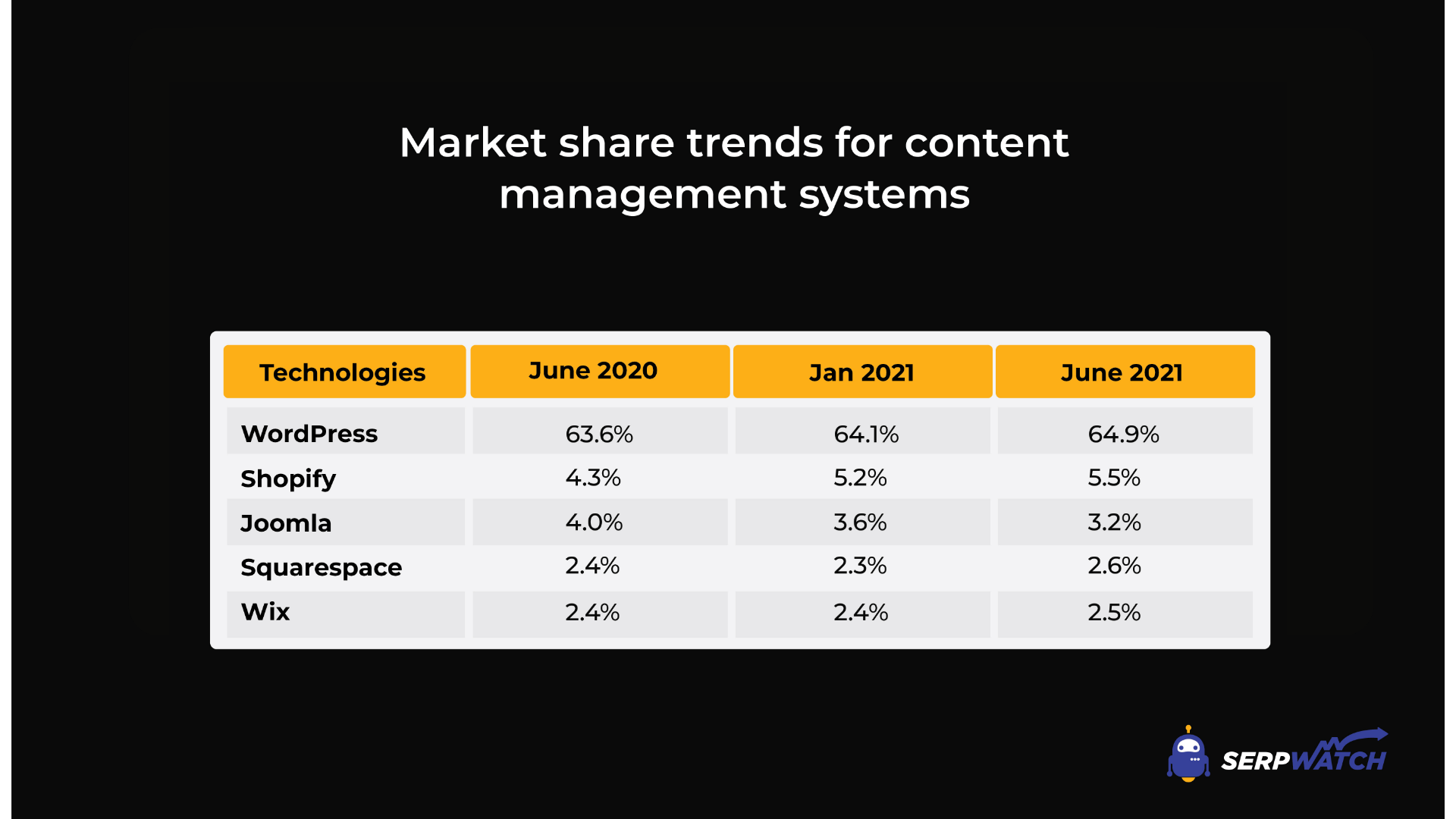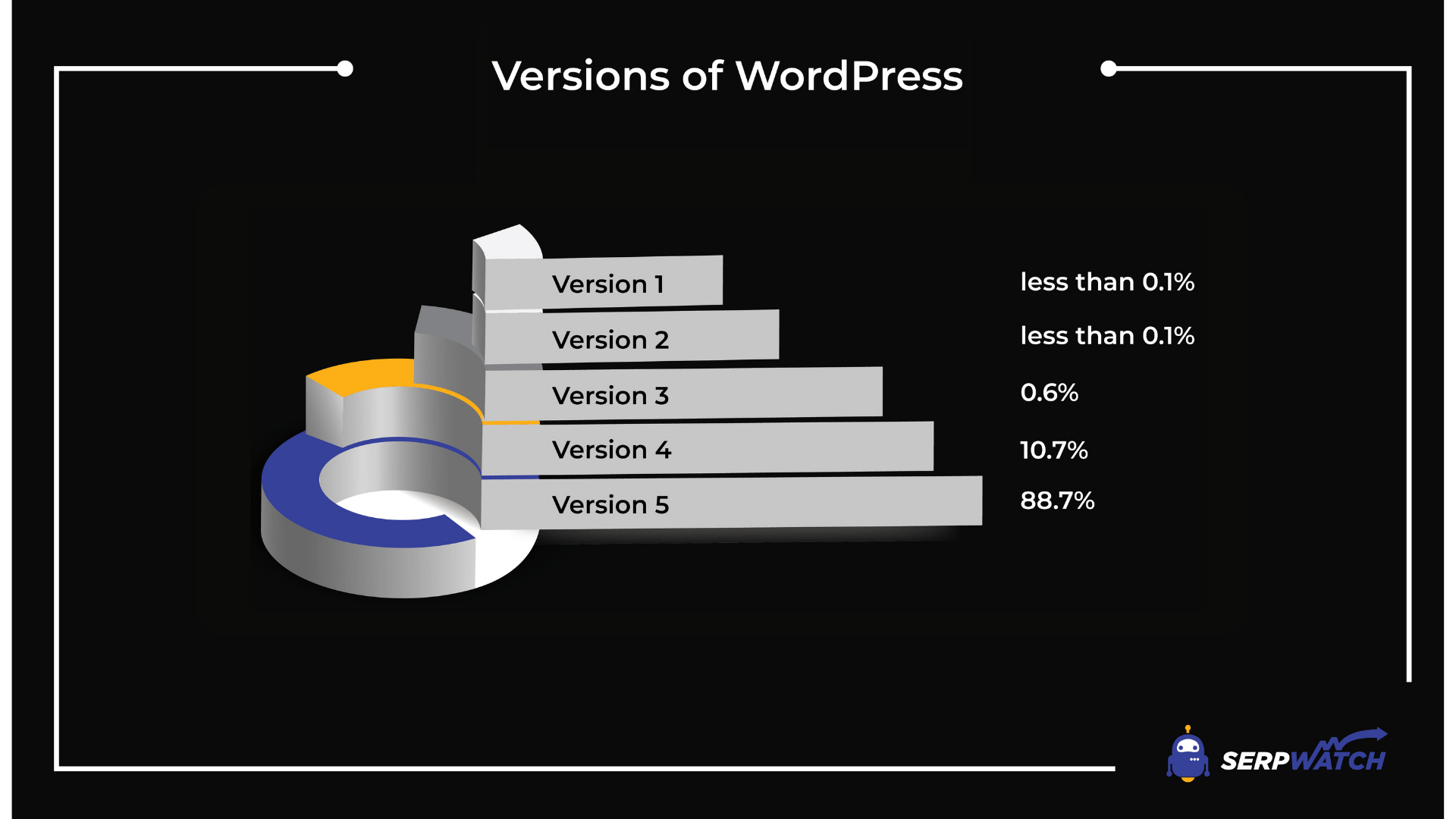
How Many Websites Use WordPress in 2024?

If you’ve spent most of the time on the internet, you probably noticed most websites use WordPress technology. Why is this content management system so popular across the globe, and what makes it stand out from the others?
Keep on reading to find out the answer.
Find in This Article:
- How much of the internet is WordPress?
- Why is WordPress so popular?
- How many WordPress plugins are available?
- How many themes does the platform support?
- Which prominent websites are built in WordPress?
- What is the number of users WordPress can handle?
- What are the cons of using WordPress?
How Many Websites Use WordPress?
To knock it off, before diving into the latest WordPress statistics, let’s see what has brought you here. The number of calculated websites on the World Wide Web is a whopping 1.86 billion.
That said, only a small percentage are actually active websites, meaning the ones that are maintained and updated. In 2020, the total number was 189 million. Over 75 million of those use WordPress technology and rely on this software solution.
The number itself says a lot about its popularity, but let’s check its additional aspects that make WordPress attractive for website owners.
How Many Websites Are Created Every Day?
Technology advances at a neck-breaking pace, and the pandemic has additionally boosted the virtual. Consequently, brands have rapidly been transitioning to digital space, not only in terms of advertising but ecommerce as well. As a result, the number of daily new websites has skyrocketed to exceed 547,200. The vast universe on the internet consists of endless websites that are categorized by different criteria (topic, theme, technical aspects, etc.)
But no matter the type of your website, SerpWatch’s features can help you evaluate, monitor, and improve your ranking. The latest WP trends point to another must-do for building a WordPress website—adding an SSL certificate is crucial for user experience. There are several reasons this can prove to be important.
First, it’s the only way for a connection to be secure and reliable (the distinction between HTTP and HTTPS). You don’t want the infamous “connection not secure” message to pop up to every user trying to visit your website. Second, Google finds it relevant as well and takes it into account when ranking organic results. And last, as the algorithm changes so frequently, the only way to excel in your strategy is by using an SEO tool such as SerpWatch.
What Percentage of Websites Are WordPress?
The main difference in terms of building a website is probably plain HTML vs. CMS. The former requires coding from scratch and is better for more permanent content that rarely needs updating because it creates static sites.
WordPress, on the other hand, uses server-side, dynamic scripting language—PHP. The server has its module installed, and user requests go through it.
The latest data as of June 2021 reveals the percentage of websites using WordPress is a stunning 41.7%. However, when it comes to the main distinction within the software, it’s in the hosting choice—WordPress.com and WordPress.org.
So what’s the difference between the two? The latter option that users often refer to as “the real WordPress” is the one that allows website owners to have full control over it.
Furthermore, there are various subcategories, the top three being:
- WooCommerce (19.6%)
- WP Bakery (16.4%)
- Elementor (12.4%)
What Percentage of CMS Market Share Does WordPress Hold?

The global web content management market was valued at $6.9 billion and is expected to reach $14.3 billion by the end of 2026—at a CAGR of 15.7%. This industry includes but is not limited to CMS. Some other categories include social media and workflow management.
When taking into account only websites that use CMS, WordPress market share is 65%, according to W3Techs report on the global CMS usage and popularity (as of June 2021). The percentage shows the two aspects among the astonishing 773 content management systems they monitor.
Furthermore, for those using WordPress, there are five versions available. The vast majority of websites run on the latest one, 88.4% precisely. Another 11% use version 4, and for versions 3, 2, and 1, the percentage seems relatively insignificant, with 0.6% and less than 0.1%.

Who Uses WordPress?
The short answer is—virtually everyone. It’s the most popular platform for blogging, ecommerce, media, and education websites. A combination of its flexible and easily customizable form, an abundance of themes, plugins, and widgets make it a unique solution for the most diverse types of requirements.
WordPress is famously known for the first category we’ve mentioned, as it started as a blogging platform only to evolve gradually into what the software is now. The latest blogging statistics reveal a stunning number of new posts per month—approximately 70 million. Furthermore, users leave about 77 million comments on those posts.
What Are the Main Benefits of Using WordPress as a CMS?
There is an abundance of factors contributing to the popularity of WordPress.
Here’s a list of the most important categories:
- SEO friendliness
- Simplicity of use
- A wide range of themes and plugins
- Customization options
- No limit on the free plan
As you can see from the list, the categories are quite universal and include a wide range of customizable features. That means WordPress users can build virtually anything they need or desire. It’s all about finding a perfect combination of available elements.
How Many WordPress Plugins Are There?
All major software solutions offer plugins to their users. But what is a plugin?
A plugin is an extension that serves a specific purpose—enhancing a feature or a category of features. As of today, there have been 58,702 plugins available to WordPress users. Of course, as in every category of the software, there are free and premium plans.
Plugins with over a million active installations are in the popular category, while user reviews are below, in a standard 1–5 stars format.
WordPress statistics reveal some of the most popular ones with the highest rating:
- Yoast SEO
- Classic Editor
- Really Simple SSL
- Contact Form by WP Forms
- MC4WP Mailchimp for WordPress
- UpDraftPlus
- LiteSpeed Cache
- Advanced Custom Fields
- Limit Login Attempts Reloaded
- Loco Translate
Websites need plugins primarily to improve their optimization for search engines, i.e., their ranking. Did you know there are differences not only by the engine (Google, Bing, Yahoo, Yandex, etc.) but also by the device type? What SerpWatch offers is the most accurate data, tracking your ranking that covers all of it — different engines and devices.
What’s the Average Number of Plugins According to WordPress Statistics for 2021?
Bear in mind that plugins can negatively affect your website’s performance and cause various safety issues. This might happen if not properly maintained and updated in accordance with your current version of the software. By installing a plugin, you’re adding to the existing code, and the chosen feature is always running in the background.
That said, it’s all about choosing the right plugin and the proper website maintenance. There’s nothing wrong with having several plugins installed if you actually need them.
When it comes to the average number of plugins in WordPress per user, statistics point to at least 20 and 30 for business websites. For advanced features, most experts round the number to 50. The more demanding the website is, the more plugins it will require to perform all the tasks smoothly.
However, some plugins can interact badly with others. That’s why you need to make sure there’s no conflict within the combination you choose. It can impact the overall performance, affect your loading speed, or create room for vulnerabilities. Updates of plugins can also cause issues. Still, with regular reports from our SEO tool, you’ll be able to notice immediately if your ranking drops drastically and act on it.
How Many WordPress Themes Are There?
Customization is one of the main aspects in which WordPress has no competition, at least in dynamic CMS. There are five main groups of filters to help you find a perfect match for your website—layout, features, columns, style, and subject.
Users can enter the type of website they want to build, and the results will automatically adapt to the most frequently used for the chosen category. There’s also filtering that can remove Premium options if a user wants to transfer to a free plan.
WordPress theme statistics indicate that the number has reached 8,416. The theme can play a significant role in the aesthetic appeal but also the overall impression on user experience. Whatever option you choose, it’s vital to make your website responsive, especially for mobile devices. This is so because over half of the total website traffic comes from mobile (54.8%) in Q1 of 2021.
Is WordPress Good for Large Websites?
The short answer is—yes. Some of the websites with the highest traffic rely on WordPress technology. But, as we’ve mentioned above, it’s all about the right setup.
Here’s a list of the most notable brands that are using WordPress:
- Spotify
- CNN
- TED
- Microsoft
- Grammarly
- Zoom
- Etsy
- Vimeo
- Wikihow
- The New York Times
- Fortune
- Yelp
- Skype
- NASA
- Sony Playstation
- Walt Disney Company
- GoDaddy
And the list goes on and on. Considering not only how many websites use WordPress but which ones as well, the conclusion is quite obvious. The software is a powerful solution that, if adequately customized, can handle the heaviest of traffic.
It’s highly recommended for large websites to invest in a dedicated hosting service (a server of their own, not a shared one.) This applies especially to online shopping websites because it’s the most demanding one in terms of both traffic and users’ expectations. As the latest ecommerce statistics point out, dedicated hosting helps resolve many on-page and technical issues and positively affects loading time.
How Many Users Can WordPress Handle?
The number of WordPress users is by no means predetermined and will solely depend on factors such as—hosting provider, server, regularity of maintenance, etc. However, with the right setup, websites in WordPress can handle heavy traffic and millions of users. As you’ve seen from the examples above, some of the most visited websites rely on WordPress.
The company reveals that more than 409 million visitors view a stunning 20 billion WordPress pages on average monthly.
Which WordPress Video Statistics Should Everyone Know?
Another advantage of WordPress is the way website owners can handle video content, as video is the most engaging form for users. It’s best to avoid uploading them since HD videos can take up a lot of bandwidth and storage space.
Instead, a better solution would be to embed links, since it supports all major platforms—YouTube, Vimeo, DailyMotion, Facebook, Instagram, Flickr, Twitch.tv, TED Talks, etc.
WP statistics for 2021 demonstrate some of the best plugins for a fully optimized website for multimedia content:
- Video Gallery
- Smash Balloon
- Envira Gallery
- YouTube Embed
- YourChannel
- All-in-One Video Gallery
- Easy Video Player
- Ultimate Video Player
Another great thing about embedding your video content directly from YouTube is that such websites attract more traffic in general. Now, that’s a great thing for your ranking. And with the latest SerpWatch feature, you can easily monitor how you rank on YouTube as on a separate engine. So, find the highest-ranking videos, and make sure to embed those links on your website to generate the most traffic.
What Is the Disadvantage of WordPress?
Being an open-source repository means that users can contribute and add their own themes and plugins that others can install. Unfortunately, this can result in various security issues and vulnerabilities for users. According to Patchstack’s report, there were roughly 70 million vulnerabilities throughout 2020. That said, the vast majority (96.22%) originated from plugins and themes uploaded by third parties.
Some of the most significant issues were:
- Cross-site scripting issues
- Injection vulnerabilities
- Cross-site request forgery issues
- Sensitive data exposure
How Can These WordPress Usage Statistics Help You?
There is no set of rules to help you easily eliminate all the risks. However, by examining which features to emphasize and choosing only the necessary plugins, you can avoid much hassle when your website’s up and running. What’s terrific about choosing this solution is that you can add or remove anything anytime.
To create or maintain a powerful website that has a good ranking, you’ll also need to understand the logic behind these WordPress statistics.
Before wrapping up this article, let’s share one important takeaway from all the things we’ve mentioned—websites built with this software are mostly what their owners make of them.
The Takeaway
In the game of CMS, it’s safe to say WordPress is in a league of its own. It’s a reliable and SEO-friendly solution with an extensive base of users, from various industry giants to small businesses and personal blogs.
Another thing to note from these WordPress statistics—this software is here to stay. Its dominance in the market results from the ease of use that makes it stand out in the sea of content management systems.
If you want to find out how to maintain your WordPress website and improve its ranking, register for a free trial with us.
Sources
Boise Web, CMinds, Elegant Themes, HubSpot, Internet Live Stats, Kinsta, Markets and Markets, Siteefy, Statista, Statista, W3Techs, W3Techs, WordPress, WordPress, WordPress, WordPress, WordPress Tavern, WordPress, WordPress, WordPress , WP Beginner, WP Beginner, WP Beginner, WP Explorer






There are currently no comments.
Be the first!))